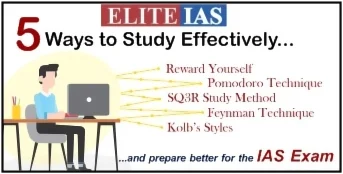The UPSC Civil Services examination is one of the nation’s most coveted competitive examinations. Every year, thousands of applicants work hard to get the exam completed, but only a few lucky ones get through. The first attempt that any applicant makes to apply for this exam is the most important of all, as it is the one that is offered with full enthusiasm.
Therefore, any applicant emerging for the first time should not merely aim at passing the Prelims but should seek to clear the mains in the first attempt. Candidates who have completed the test in the past are an excellent resource when it comes to collecting information for the successful completion of the exam.
Understand the Syllabus
Good understanding and obedience to the syllabus is the primary requirement of civil service examination planning. Civil services are renowned for their rigorous and lengthy curriculum, and a good understanding of the essence, consistency, and content of the syllabus is essential to proper preparation. It helps to understand what to read and what not to read.
It is highly recommended that every candidate should have an available copy of the syllabus at every level of the test. It will enable the candidate to determine whether or not a specific subject needs to be addressed, while also encouraging the candidate not to leave any segment or subject unattended.
Thoroughly solve previous years’ question papers
Often, candidates must go through the past year’s question papers. They help to assess the form of questions and also to find the right range of reading content. It would be useful to recognize patterns in the question papers if any. It is advisable to separate the topics listed in the syllabus into subtopics and to take another look at the question papers.
Often, gazing through previous years’ question papers, upon finishing the syllabus, allows getting a hold on the nature of the questions. On the better side, there may be a possibility that specific questions from previous years would be answered.
Emphasis on current affairs
Keep up to date on what’s going on around the planet. Current affairs are not a different topic to be addressed, but an essential part of the UPSC syllabus. Current relations and current problems are, in essence, the diverse areas of all the curricula that are most relevant from the study. Print a newspaper and a magazine daily.
Create a copy
It is also advised to keep copies of everything you learn – whether they be articles or magazines on public events or the fundamentals of the different topics addressed by coaching. Taking notes is a helpful method for studying and memorizing.
Also, theme-based and organized notes are useful and convenient at the last minute revision of the extensive UPSC system that has been spread over some time. Using mind graphs, flow charts, workaround methods, etc. to render notes helps for quick editing and improved memory.
Coaching for the Civil Service examinations
Coaching is the most critical aspect of breaking the civil service examination. One must be vigilant to pick the best coaching partner to create the framework for the preparation. Focus on the lectures and make a point of writing it down. Coaching institutes are now administering assessments that may be useful in assessing the present state of readiness.
Stick to the NCERT
It is also a smart idea to continue planning by having the fundamentals of the topic in order. NCERT books are the most significant source of insight and a stable grip on different topics. The purpose of the UPSC is not to search for any advanced expertise, but mostly to evaluate general knowledge over a broad spectrum and, more specifically, conceptual skills in the Prelims and communication and presenting skills in the Mains.
Aspirants in Public Services frequently get bogged down in material by linking to several books at a time. It is advised to concentrate on a few books at a time – the NCERTs plus one or two books per topic chosen by the professors. More than the number of books, it’s essential to take a detailed look at the text. Learn the same book a couple of times to get a clear handle on it. Reflect only on what is stated in the syllabus rather than reading the whole text.
Introspection
Build a way of thought – in terms of establishing a connection between a given topic or problem and other topics. There is a lot of cross-questioning going on during interviews, and this approach allows one to be fully informed about every given topic. The applicant should always be able to connect the things. This approach often creates a permanent impact on the subject, making it easier to remember both during the review and the interview.
The Optional Challenge
Most candidates are not aware of the optional subject they want to select. Some are requesting recommendations from others while agreeing on an optional topic. Instead, the alternative subject must be something one is relaxed about and, therefore, definite in. Also, when deciding on an alternative, do not dwell on whether candidates performed on the topic in previous years.
Applicants can, in no small measure, take up an option in which they have more than passing interest and which has the highest syllabus corresponding with that of General Studies, or in which they have some prior knowledge.
The Internet helps to keep up-to-date with whatever’s going on. It is an easy way to stay up-to-date, spatially with the optional subject. Often, it is crucial to define and adhere to a reliable and “trusted” source, because referring to 10 separate sources at a time is not as effective as referring to 10 others.
The regular habit of reading newspapers
The most accessible approach is to pick one or a combination of 2 influential newspapers. Civil aspirants must make it their routine to wake up early, and reading a newspaper will be their first duty every day.
No matter how complicated it can seem at the outset, be daily reading the newspaper. Delaying the habit of reading the newspaper could be counterproductive to the planning of the test.
Notes are essential
In the early phases of planning, civil service aspirants are not sure what to find in a newspaper and what should be omitted. They must include a rundown of all the essential articles to be read regularly, which lets you retain the attention on just the appropriate sections of the newspaper. Takedown the notes of anything that seems to be significant. References can be tremendous support throughout the editing because it is impossible to go back to anything in-depth at the last minute.
For more clarity, make comments on a very, very critical topic; 2 or 3-page reports on current affairs in a week would be sufficient enough. It would be a smart idea to make comments on the opinion pages of the articles. Reading the publications allows you to appreciate the general meaning of the topic under consideration. Since the journal is a compilation of notes written by the qualified staff, including information from the newspapers would offer an additional edge in the planning process.
Can you clear the UPSC Civil Services Preliminary Exam with just six months of preparation?
You need the right technique to break IAS in the first round. Candidates sometimes consider the Civil Services Test a hard nut to crack, not because of lack of diligent work or ability, but because of a lack of right strategy.
Even if you start planning now, you must follow the right tactics, do the correct research, know what is required, and don’t get behind anything under the sun. You will clear UPSC CSE Prelims with only six months of training.
In the first try, the only approach to clear the civil service grounds is to create a constructive outlook and a realistic plan. You can access the Clear IAS Prelims Online Test Sequence at any time and take mock exams depending on your preference before the next Prelims.
Blind study and mugging up a lot of stuff will not benefit you in Prelims or Mains. A combination of IAS online simulation tests, IAS learning materials, and suggested books would be the best approach.
Conclusions
The selection examination of civil services needs not more than one year of training if the fundamentals are well developed. The graduation cycle could be loosely defined as the best time to start training for the Civilians.
Limited books can provide substantial advantages. You don’t need to read the same topic from several outlets. Alternatively, read the subject from a reputable source as many times as possible.
Schedule your study time and adhere to it. You don’t need to study 9 to 10 hours daily. Aim to provide an active schedule and function accordingly. Successful Performance is never simple. One’s got to work hard to crack the civil service examination.



